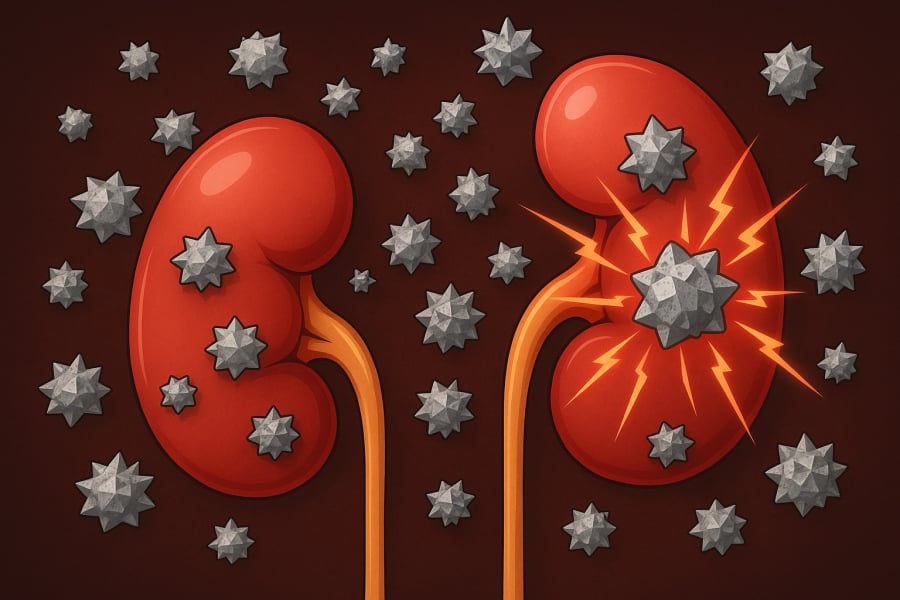Did you know that your favorite boba tea, soft cakes, and chilled sodas could be silent enemies of your kidneys? Imagine your kidneys as a giant blood-filtering machine, helping your body detox and stay healthy. When your body has high sugar levels, this machine has to work harder and may even “wear out” over time. This may sound far-fetched, but the truth is that many people are facing the risk of chronic kidney disease without even realizing it.
In this article, we will delve deeper into the connection between a high-sugar diet and kidney health, and learn effective ways to protect our kidneys.
Sugar – The Unsuspected Culprit Behind Kidney Damage
Who would have thought that sugar, a familiar ingredient in our daily lives, could be silently harming our kidneys? When you consume excessive amounts of sugar, especially glucose and fructose, it disrupts your metabolism, leading to obesity, which is a major risk factor for type 2 diabetes.
Diabetes and long-term metabolic disorders can damage the blood vessel system in your body, including the tiny capillaries that nourish your kidneys. When these capillaries weaken, the kidneys’ blood-filtering capacity decreases, increasing the risk of chronic kidney disease.
Additionally, sugar prompts your body to absorb more sodium in the small intestine. As a result, high salt levels in the blood force the kidneys to work continuously to eliminate the excess, leading to a significant decline in kidney function over time.

Fructose – The Silent Killer That Forms Kidney Stones
Fructose, a common sugar found in soft drinks, syrups, and candies, can increase calcium and oxalate levels in urine. This creates a favorable environment for the formation of calcium oxalate crystals, the main component of kidney stones. As these stones grow, they can obstruct the urinary tract, leading to serious kidney damage if left untreated.
Moreover, a less noticed but equally dangerous impact is the reduction in nitric oxide (NO) synthesis, which helps maintain the flexibility of blood vessels. Decreased NO levels cause blood vessel constriction, leading to high blood pressure – a significant risk factor accelerating the decline of kidney function.
Dietary Secrets to Kidney Protection
So, how can we protect our kidneys from the dangers of sugar? Firstly, prioritize natural foods and limit sugary foods and beverages. Fruits with low sugar content, such as grapefruit, oranges, lemons, apples, and papayas, are excellent choices to get your vitamins and minerals without the excess sugar.
Additionally, maintaining a healthy weight, controlling blood sugar and blood pressure, exercising regularly, avoiding smoking, and moderating alcohol intake are all crucial factors in improving kidney function. Think of your kidneys as faithful companions, constantly filtering your blood and supporting your health. If you take good care of them, they will repay you with robust health.

Final Message: Guard Your Kidney Health, Starting with the Small Things
A high-sugar diet not only leads to obesity and diabetes but is also a hidden cause of kidney damage. Remember, kidney health is not just someone else’s responsibility; it’s how you show care for yourself and your future. Don’t let those sweet, fragrant drops become silent enemies of your precious kidneys.
Start today by changing your dietary habits, choosing healthy foods, and taking meticulous care of your kidneys. Because kidney health is the foundation of overall wellness. And when you have healthy kidneys, achieving a better quality of life becomes that much easier!
The Secret to Reducing Bitter Melon’s Bitterness by 70%: A Trick Up Your Sleeve.
Bitter melon, or bitter gourd, is renowned for its cooling and health-boosting properties. However, its intense bitterness can be off-putting to many, making it a challenging vegetable to consume. The key to enjoying this nutritious treat lies in minimizing its bitter taste, thus making it more palatable for those who wish to reap its benefits without enduring an overpowering bitterness.
Does Drinking Lemongrass Tea Have Any Health Benefits?
Voi [pronounced: voy] is a traditional Vietnamese herbal drink, often referred to as a ‘rustic refreshment’. This humble beverage, made from the leaves of the Voï plant, is believed to possess therapeutic properties in traditional Eastern medicine. Beyond its refreshing qualities, Voi is also revered for its medicinal benefits, offering a natural remedy for various ailments.
The Ultimate Superfruit: Nature’s Candy with Astonishing Health Benefits
Introducing the revolutionary superfruit that is taking the health world by storm! With an incredible sweetness that surpasses cane sugar by 300 times, this fruit is a game-changer for those conscious of their health. But the benefits don’t stop there – it also boasts the ability to support cancer prevention, all without spiking blood sugar levels. This natural wonder is truly a gift from nature, and it’s easy to see why it’s becoming a favorite among health enthusiasts.





































